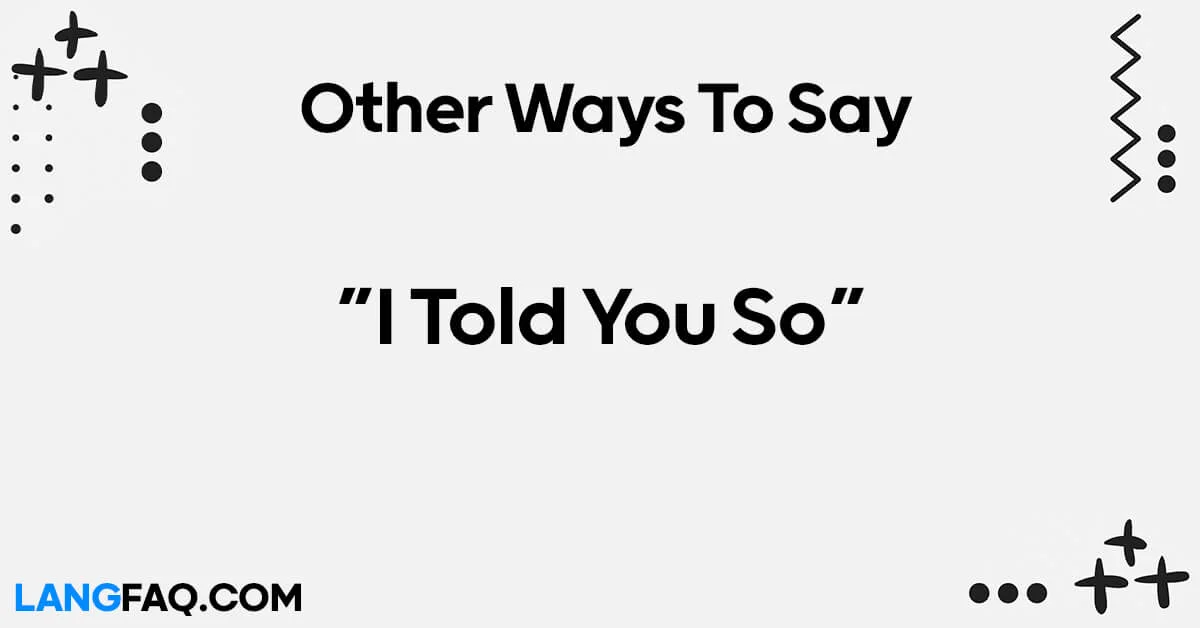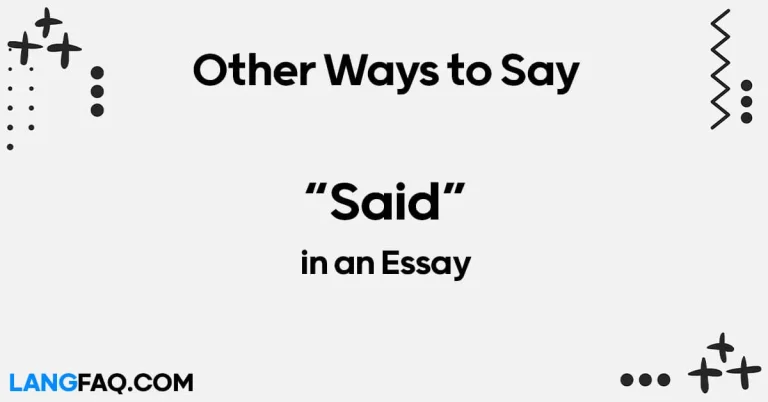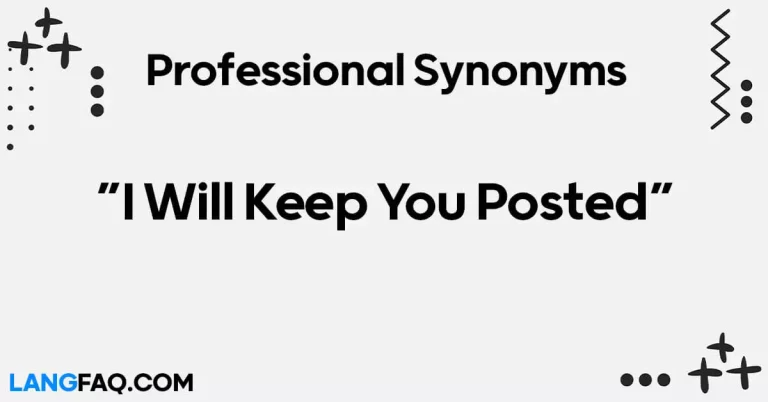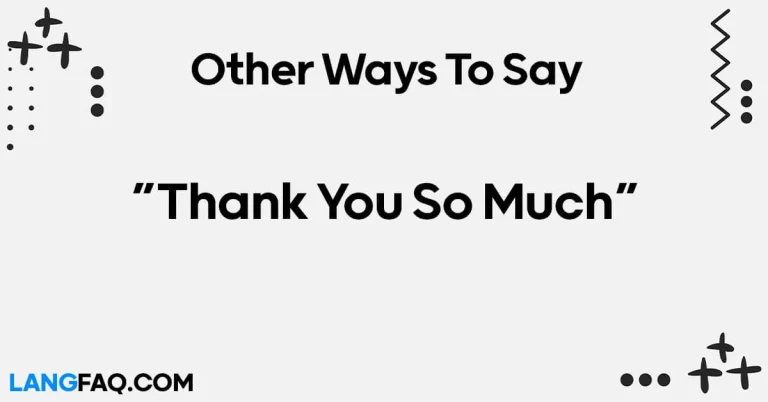In everyday conversations, expressing “I told you so” can sometimes come off as smug or irritating. However, there are numerous alternative phrases that can convey the same sentiment in a more positive and uplifting manner. This article explores 12 other ways to say “I told you so,” providing you with a toolkit of expressions to use in various situations without rubbing it in. Let’s delve into these optimistic alternatives that maintain harmony in communication.
12 Other Ways to Say “I Told You So”
Here are 12 other ways to say “I told you so”:
- I mentioned it earlier.
- As I predicted.
- Just as I thought.
- Remember when I said?
- It looks like my advice was right.
- I had a feeling this would happen.
- Looks like I was on the mark.
- I did mention this possibility.
- Seems like my instincts were correct.
- This outcome aligns with what I suggested.
- As I pointed out before.
- It appears my foresight was accurate.
| Expression | Meaning | Example |
|---|---|---|
| I mentioned it earlier. | Indicates prior mention or prediction. | “I mentioned it earlier that traffic would be heavy.” |
| As I predicted. | Highlights accurate foresight. | “As I predicted, the project was completed ahead of schedule.” |
| Just as I thought. | Confirms expectations. | “Just as I thought, the new recipe was a hit.” |
| Remember when I said? | Reminds of past advice. | “Remember when I said investing in tech stocks would pay off?” |
| It looks like my advice was right. | Affirms the correctness of advice. | “It looks like my advice was right; the strategy yielded positive results.” |
| I had a feeling this would happen. | Expresses intuition. | “I had a feeling this would happen; the team worked seamlessly together.” |
| Looks like I was on the mark. | Indicates accuracy. | “Looks like I was on the mark with my estimate for the budget.” |
| I did mention this possibility. | Reminds of previous mention. | “I did mention this possibility during our last meeting.” |
| Seems like my instincts were correct. | Acknowledges intuition. | “Seems like my instincts were correct about the client’s preferences.” |
| This outcome aligns with what I suggested. | Correlates with previous advice. | “This outcome aligns with what I suggested in our initial proposal.” |
| As I pointed out before. | Highlights prior observation. | “As I pointed out before, customer satisfaction is key to retention.” |
| It appears my foresight was accurate. | Indicates accurate prediction. | “It appears my foresight was accurate regarding market trends.” |
In conclusion, these alternative expressions offer tactful ways to convey the sentiment of “I told you so” without coming across as boastful or condescending. By using language that acknowledges previous advice or predictions in a positive and respectful manner, communication can remain constructive and conducive to healthy relationships.
Is It Correct to Say “I Told You So”?
Certainly! Here’s each sentence on a new line:
The phrase “I told you so” is commonly used to assert one’s correctness or to remind someone that their previous advice or prediction was accurate.
While it is technically correct to say “I told you so” in informal contexts, it can come across as boastful, patronizing, or confrontational.
As a result, it’s often considered impolite or rude, particularly in professional or formal settings.
Using alternative expressions or phrasing, as discussed in the previous sections, can help convey the same message in a more tactful and respectful manner.
These alternatives allow individuals to assert their correctness without causing friction in the conversation or damaging relationships.
Therefore, while “I told you so” may be grammatically correct, it’s generally advisable to use more diplomatic language to maintain positive communication and foster healthy interactions.
Professional Mail Example With “I Told You So”
Subject: Confirmation of Previous Discussion Points
Dear [Recipient],
I hope this email finds you well.
I wanted to circle back to our recent conversation about [topic].
As I mentioned during our discussion, [briefly summarize the advice or prediction].
Now, as we’re seeing [outcome or situation], it’s evident that the foresight provided was accurate.
Looking forward to further collaboration and success.
Best regards, [Your Name]
The Friendly Reminder
The phrase “I mentioned it earlier” serves as a gentle reminder of previously offered advice or predictions. This expression can be used in both formal and informal contexts to subtly bring attention to your prior input without appearing overly assertive.
When to Use:
The friendly reminder is suitable for situations where you want to subtly emphasize that you had already mentioned something before. It can be employed in various settings, such as professional meetings, discussions among friends, or even in family conversations.
Example:
Scenario: During a team meeting, you remind your colleagues about a potential issue that you had previously mentioned.
Dialogue: Colleague: “We’re facing some challenges with the project timeline.” You: “I mentioned it earlier that we might encounter delays if we don’t allocate enough resources.”
Email Sample:
Subject: Reminder of Previous Discussion Points
Hi Team,
I hope this email finds you well. I wanted to circle back to a topic we discussed in our last meeting regarding project timelines. As I mentioned earlier, it’s crucial that we allocate sufficient resources to avoid any potential delays.
Looking forward to your thoughts on how we can address this effectively.
Best regards, [Your Name]
Variations:
- In a mentor-mentee context: “As I previously advised…”
- Among friends: “Hey, just a quick reminder about what I mentioned earlier…”
Pros:
- Maintains a positive and non-confrontational tone.
- Reinforces your input without being overly assertive.
Cons:
- May not be as direct as other expressions, leading to potential misunderstandings if the message is not clear.
Tips:
- Use a friendly tone to avoid coming across as patronizing.
- Keep the reminder brief and relevant to the current discussion.
Insights:
According to Cambridge Dictionary, a reminder is “something that makes you remember a particular thing.”
As I Predicted
The phrase “As I predicted” confidently asserts that your foresight was accurate and aligns with the current situation or outcome. It can be used to subtly remind others of your previous predictions without sounding boastful.
When to Use:
“As I predicted” is suitable for situations where you want to assert your accuracy in forecasting outcomes. It can be employed in professional settings, academic discussions, or even casual conversations where you want to highlight your insight.
Example:
Scenario: Discussing market trends with colleagues, you mention your previous prediction about a particular stock’s performance.
Dialogue: Colleague: “Did you see the latest report on XYZ Corporation’s stocks?” You: “Yes, as I predicted, they’ve experienced significant growth in the past quarter.”
Email Sample:
Subject: Confirmation of Previous Predictions
Dear [Recipient],
I trust this email finds you well. I wanted to follow up on our recent discussions regarding market trends. As I predicted in our previous correspondence, we’re witnessing the anticipated growth in [specific area].
Looking forward to further analyzing the data together.
Best regards, [Your Name]
Variations:
- In a mentor-mentee context: “As I had foreseen…”
- Among friends: “Remember when I said this would happen? Well, as I predicted…”
Pros:
- Asserts your foresight with confidence.
- Subtly reminds others of your previous predictions.
Cons:
- May come across as overly confident if not used in appropriate contexts.
Tips:
- Use this phrase when you are confident in your predictions and want to reinforce your credibility.
- Pair it with supporting evidence or data for added impact.
Insights:
According to Cambridge Dictionary, predict means “to say that an event or action will happen in the future, especially as a result of knowledge or experience.”
Just as I Thought
The expression “Just as I thought” signifies that the current situation aligns perfectly with your expectations or assumptions. It can be used to validate your initial assessment without appearing arrogant.
When to Use:
“Just as I thought” is appropriate for situations where you want to confirm that your expectations have been met or exceeded. It can be used in various contexts, including professional discussions, personal interactions, or even when reflecting on past events.
Example:
Scenario: Discussing the outcome of a project with your team, you remark on how it unfolded exactly as you anticipated.
Dialogue: Colleague: “The project went remarkably smoothly, don’t you think?” You: “Absolutely, just as I thought. Our thorough planning paid off.”
Email Sample:
Subject: Project Outcome Confirmation
Hi Team,
I hope you’re all doing well. I wanted to take a moment to reflect on the outcome of our recent project. Just as I thought, our collaborative efforts and attention to detail resulted in a successful implementation.
Looking forward to celebrating our achievements together.
Best regards, [Your Name]
Variations:
- In a mentor-mentee context: “Just as we discussed…”
- Among friends: “Remember when we talked about this? It’s happening just as I thought.”
Pros:
- Validates your initial assessment without sounding boastful.
- Encourages confidence in your judgment or intuition.
Cons:
- May appear dismissive if not used carefully, particularly in situations where others had differing expectations.
Tips:
- Use this expression when you want to acknowledge the alignment between your expectations and the actual outcome.
- Pair it with positive reinforcement to celebrate the successful outcome.
Insights:
According to Cambridge Dictionary, thought means “a single act of thinking.” When used in the context of this expression, it refers to a previous assessment or assumption.
Remember When I Said?
The phrase “Remember when I said?” serves as a friendly reminder of past advice or predictions that have come to fruition. It can be used to gently assert your correctness without causing friction in the conversation.
When to Use:
“Remember when I said?” is suitable for situations where you want to subtly remind others of your previous advice or predictions in a lighthearted manner. It can be employed in both professional and personal settings to validate your insights.
Example:
Scenario: Reflecting on a successful outcome, you remind your colleague about a suggestion you made earlier.
Dialogue: Colleague: “I can’t believe we pulled it off!” You: “Remember when I said we should take that unconventional approach? Looks like it paid off!”
Email Sample:
Subject: Recall of Previous Discussion
Hi [Recipient],
I hope you’re having a great day. Just a quick note to remind you of our previous discussion about [topic]. Remember when I said [advice]? It seems like that approach has yielded positive results, just as we anticipated.
Looking forward to further collaboration.
Best regards, [Your Name]
Variations:
- In a mentor-mentee context: “Remember our conversation about this?”
- Among friends: “Hey, remember when I mentioned this? It’s happening now!”
Pros:
- Provides a friendly and non-confrontational way to assert your correctness.
- Encourages others to acknowledge and appreciate your insights.
Cons:
- May not be suitable for all situations, particularly if the other person feels defensive about their own input.
Tips:
- Use this phrase in a casual and friendly tone to avoid sounding confrontational.
- Pair it with positive reinforcement to celebrate the successful outcome together.
Insights:
According to Cambridge Dictionary, recall means “to bring the memory of a past event into your mind, and often to give a description of what you remember.”
It Looks Like My Advice Was Right
The expression “It looks like my advice was right” confidently asserts the accuracy of your guidance or suggestions. It can be used to acknowledge your correctness in a situation without appearing boastful.
When to Use:
“It looks like my advice was right” is appropriate for situations where you want to assert your correctness in a straightforward manner. It can be employed in professional contexts, academic discussions, or even personal conversations where your advice has proven to be effective.
Example:
Scenario: Reflecting on the successful implementation of a strategy, you assert the accuracy of your advice.
Dialogue: Colleague: “The new marketing campaign exceeded our expectations!” You: “Absolutely, it looks like my advice was right about targeting that demographic.”
Email Sample:
Subject: Validation of Previous Advice
Dear [Recipient],
I hope this email finds you well. I wanted to take a moment to acknowledge the success of our recent endeavors. It looks like my advice about [specific recommendation] was right, as evidenced by the positive outcomes we’ve achieved.
Looking forward to continued collaboration and success.
Best regards, [Your Name]
Variations:
- In a mentor-mentee context: “Looks like the guidance I provided was accurate.”
- Among friends: “Hey, it seems like my suggestion worked out after all!”
Pros:
- Asserts your correctness in a direct and confident manner.
- Validates your expertise and insight.
Cons:
- May come across as self-congratulatory if not used tactfully.
Tips:
- Use this phrase when you are confident in the accuracy of your advice and want to assert it with conviction.
- Pair it with evidence or results to reinforce your credibility.
Insights:
According to Cambridge Dictionary, right means “correct or true in every detail.” When used in this expression, it signifies the accuracy of your advice or guidance.
I Had a Feeling This Would Happen
The expression “I had a feeling this would happen” suggests that you had an intuitive sense or anticipation about the outcome. It can be used to subtly convey your foresight without sounding overly confident.
When to Use:
“I had a feeling this would happen” is suitable for situations where you want to acknowledge your intuition or gut instinct about a particular outcome. It can be employed in various contexts, including personal conversations, professional settings, or when reflecting on past events.
Example:
Scenario: Reflecting on the success of a decision, you mention your intuition about the outcome.
Dialogue: Colleague: “I can’t believe everything fell into place so perfectly!” You: “Actually, I had a feeling this would happen. Sometimes, you just have to trust your instincts.”
Email Sample:
Subject: Acknowledgment of Intuition
Hi [Recipient],
I hope you’re doing well. I wanted to share a quick thought with you. I had a feeling this would happen, and it’s truly gratifying to see our efforts come to fruition.
Looking forward to more collaborative successes in the future.
Best regards, [Your Name]
Variations:
- In a mentor-mentee context: “Trusting your intuition is key in situations like these.”
- Among friends: “I had a hunch this would work out. Looks like I was right!”
Pros:
- Validates your intuition or gut instinct.
- Provides a humble way to assert your foresight.
Cons:
- May downplay the role of strategic planning or analysis in decision-making if overused.
Tips:
- Use this phrase when you want to acknowledge your intuition without appearing overly confident.
- Pair it with reflections on the decision-making process to provide context for your intuition.
Insights:
According to Cambridge Dictionary, feeling refers to “an idea, belief, or opinion.” When used in this expression, it signifies an intuitive sense or anticipation about a particular outcome.
Looks Like I Was on the Mark
The expression “Looks like I was on the mark” suggests that your assessment or prediction was accurate and precise. It can be used to assert your correctness in a confident yet humble manner.
When to Use:
“Looks like I was on the mark” is appropriate for situations where you want to assert the accuracy of your assessment or prediction without appearing boastful. It can be employed in professional discussions, academic contexts, or even personal conversations where your judgment has been validated.
Example:
Scenario: Reviewing the results of a market analysis, you affirm the accuracy of your projections.
Dialogue: Colleague: “The market data confirms our initial estimates.” You: “Indeed, looks like I was on the mark with our projections. Our analysis was thorough.”
Email Sample:
Subject: Confirmation of Accuracy
Dear [Recipient],
I hope this email finds you well. I wanted to take a moment to acknowledge the recent developments. It looks like I was on the mark with our initial assessment, as evidenced by the latest data.
Looking forward to further discussions on how we can capitalize on these insights.
Best regards, [Your Name]
Variations:
- In a mentor-mentee context: “Our analysis turned out to be spot-on.”
- Among friends: “Hey, it seems like my estimate was right on the money!”
Pros:
- Asserts the accuracy of your assessment or prediction.
- Maintains a humble tone while still conveying confidence.
Cons:
- May appear overly confident if used inappropriately or excessively.
Tips:
- Use this phrase when you are confident in the precision of your assessment and want to acknowledge it with humility.
- Pair it with evidence or data to support your assertion.
Insights:
According to Cambridge Dictionary, being “on the mark” means being “exactly right or correct.”
I Did Mention This Possibility
The phrase “I did mention this possibility” serves as a reminder that you had previously discussed or considered the current situation. It can be used to subtly assert your input without sounding confrontational.
When to Use:
“I did mention this possibility” is suitable for situations where you want to remind others of your prior discussion or prediction without appearing confrontational. It can be employed in professional meetings, academic debates, or even casual conversations where your input is relevant.
Example:
Scenario: Discussing potential challenges with a project, you remind your team about a scenario you had previously mentioned.
Dialogue: Colleague: “We didn’t anticipate this issue arising.” You: “Actually, I did mention this possibility during our last meeting. It’s something we need to address.”
Email Sample:
Subject: Reminder of Previous Discussion Points
Hi Team,
I hope this email finds you well. I wanted to circle back to a topic we discussed in our last meeting regarding [specific issue]. As I mentioned earlier, it’s crucial that we address this potential challenge proactively.
Looking forward to your input on how we can mitigate this risk.
Best regards, [Your Name]
Variations:
- In a mentor-mentee context: “I recall discussing this scenario with you previously.”
- Among friends: “Hey, remember when I brought this up? Looks like it’s happening now.”
Pros:
- Provides a gentle reminder of previous discussions or considerations.
- Encourages others to acknowledge and consider your input.
Cons:
- May be perceived as nitpicking if used excessively or inappropriately.
Tips:
- Use this phrase when you want to assert your input without causing friction in the conversation.
- Be concise and specific about the previous discussion or prediction you are referring to.
Insights:
According to Cambridge Dictionary, a possibility is “a chance that something may happen or be true.” When used in this expression, it refers to a potential scenario or outcome that was previously discussed or considered.
Seems Like My Instincts Were Correct
The expression “Seems like my instincts were correct” suggests that your intuition or gut feeling was accurate in predicting the outcome. It can be used to acknowledge the validity of your instincts without appearing boastful.
When to Use:
“Seems like my instincts were correct” is appropriate for situations where you want to acknowledge the accuracy of your intuition or gut feeling. It can be employed in various contexts, including professional decisions, personal judgments, or even casual observations where your instincts have been validated.
Example:
Scenario: Reflecting on a successful business decision, you attribute it to your instincts.
Dialogue: Colleague: “How did you know this strategy would work?” You: “Well, seems like my instincts were correct. Sometimes, you just have to trust your gut.”
Email Sample:
Subject: Validation of Intuition
Hi [Recipient],
I hope you’re doing well. I wanted to share some thoughts with you. It seems like my instincts were correct about [specific situation], and I’m pleased with the positive outcome.
Looking forward to more opportunities to leverage our intuition in future decisions.
Best regards, [Your Name]
Variations:
- In a mentor-mentee context: “Trusting our instincts paid off in this instance.”
- Among friends: “I had a feeling this would happen. Looks like I was right to trust my gut!”
Pros:
- Validates the importance of intuition or gut feeling in decision-making.
- Provides a humble way to assert the accuracy of your instincts.
Cons:
- May downplay the role of rational analysis or strategic planning if overused.
Tips:
- Use this phrase when you want to acknowledge the role of intuition in a decision or outcome.
- Reflect on the factors that led to your intuition being correct to provide context for your assertion.
Insights:
According to Cambridge Dictionary, instinct refers to “the way people or animals naturally react or behave, without having to think or learn about it.” When used in this expression, it signifies an intuitive sense or judgment that was proven correct.
This Outcome Aligns with What I Suggested
The phrase “This outcome aligns with what I suggested” confirms that the current result corresponds to your previous advice or recommendation. It can be used to assert the validity of your input without appearing arrogant.
When to Use:
“This outcome aligns with what I suggested” is suitable for situations where you want to acknowledge that the current result is consistent with your previous advice or recommendation. It can be employed in professional discussions, academic debates, or even personal conversations where your input has been validated.
Example:
Scenario: Reviewing the success of a project, you highlight how it reflects your initial recommendation.
Dialogue: Colleague: “The project outcome exceeded our expectations!” You: “Indeed, this outcome aligns with what I suggested at the outset. It’s gratifying to see our efforts pay off.”
Email Sample:
Subject: Confirmation of Alignment with Previous Advice
Dear [Recipient],
I trust this email finds you well. I wanted to take a moment to acknowledge the success of our recent project. This outcome aligns with what I suggested during the planning phase, and it’s rewarding to see our efforts come to fruition.
Looking forward to building on this success in future endeavors.
Best regards, [Your Name]
Variations:
- In a mentor-mentee context: “The result we achieved is in line with the guidance I provided.”
- Among friends: “Remember when I mentioned this? It’s exactly how I thought it would turn out!”
Pros:
- Asserts the validity of your input without sounding boastful.
- Highlights the alignment between your advice and the actual outcome.
Cons:
- May be perceived as self-congratulatory if not used in appropriate contexts.
Tips:
- Use this phrase when you want to acknowledge that the current result reflects your previous advice or recommendation.
- Pair it with reflections on the decision-making process to provide context for your suggestion.
Insights:
According to Cambridge Dictionary, align means “to put two or more things into a straight line.” When used in this expression, it signifies the correspondence between the current outcome and your previous suggestion or recommendation.
As I Pointed Out Before
The phrase “As I pointed out before” emphasizes that you have previously mentioned or highlighted a particular point. It can be used to assert the continuity of your input without appearing confrontational.
When to Use:
“As I pointed out before” is appropriate for situations where you want to remind others that you have already discussed or highlighted a specific point. It can be employed in various contexts, including professional meetings, academic debates, or even personal conversations where your input is relevant to the current discussion.
Example:
Scenario: During a discussion about project priorities, you remind your team of a previously mentioned consideration.
Dialogue: Colleague: “We need to prioritize our tasks for the upcoming quarter.” You: “Absolutely, and as I pointed out before, addressing the resource constraints should be our top priority.”
Email Sample:
Subject: Reminder of Previous Discussion Points
Hi Team,
I hope you’re doing well. I wanted to revisit a topic that we discussed in our last meeting. As I pointed out before, addressing [specific issue] is critical for the success of our upcoming projects.
Looking forward to your insights on how we can tackle this effectively.
Best regards, [Your Name]
Variations:
- In a mentor-mentee context: “As I mentioned earlier…”
- Among friends: “Remember when I brought this up? It’s still relevant.”
Pros:
- Provides a gentle reminder of previously discussed points.
- Encourages others to consider and acknowledge your input.
Cons:
- May be perceived as repetitive if overused or if the point has already been adequately addressed.
Tips:
- Use this phrase when you want to remind others of a specific point without causing friction in the conversation.
- Be concise and specific about the previous discussion or point you are referring to.
Insights:
According to Cambridge Dictionary, point out means “to draw attention to something or someone.” When used in this expression, it signifies the act of highlighting or mentioning a particular point in a previous discussion.
It Appears My Foresight Was Accurate
The expression “It appears my foresight was accurate” suggests that your ability to predict or anticipate future events was correct. It can be used to assert the validity of your foresight without sounding boastful.
When to Use:
“It appears my foresight was accurate” is suitable for situations where you want to acknowledge that your predictions or anticipations have been proven correct. It can be employed in professional discussions, academic debates, or even personal conversations where your foresight has been validated.
Example:
Scenario: Reflecting on the success of a strategic decision, you attribute it to your foresight.
Dialogue: Colleague: “How did you anticipate this outcome?” You: “Well, it appears my foresight was accurate. Sometimes, experience and analysis pay off.”
Email Sample:
Subject: Validation of Foresight
Dear [Recipient],
I trust this email finds you well. I wanted to share some reflections with you. It appears my foresight was accurate about [specific situation], and I’m pleased with the positive outcome.
Looking forward to leveraging our foresight in future endeavors.
Best regards, [Your Name]
Variations:
- In a mentor-mentee context: “It seems my ability to foresee potential outcomes was on point.”
- Among friends: “I had a feeling this would happen. Looks like my gut was right!”
Pros:
- Validates your ability to predict or anticipate future events.
- Provides a humble way to assert the accuracy of your foresight.
Cons:
- May downplay the role of analysis or strategic planning if overused.
Tips:
- Use this phrase when you want to acknowledge the role of foresight in a decision or outcome.
- Reflect on the factors that led to your foresight being accurate to provide context for your assertion.
Insights:
According to Cambridge Dictionary, foresight refers to “the ability to judge correctly what is going to happen in the future and plan your actions based on this knowledge.” When used in this expression, it signifies the accuracy of your predictions or anticipations about future events.
FAQs
Q: Can using alternative phrases really prevent misunderstandings in communication? Absolutely! By choosing more positive and uplifting expressions, you can maintain harmony in communication and avoid potential conflicts or misunderstandings.
Q: How can I ensure that my message comes across as supportive rather than condescending? Focus on empathy, understanding, and collaboration. Frame your message in a way that acknowledges the other person’s perspective and emphasizes mutual respect.
Q: Are these alternatives suitable for both personal and professional situations? Yes, absolutely. These phrases can be used in various contexts, including personal conversations, professional interactions, and even formal correspondence.
Q: What if the other person still doesn’t acknowledge my point, despite using these alternatives? Sometimes, people may not be receptive to feedback regardless of how it’s delivered. In such cases, focus on maintaining a positive and respectful attitude.
Q: How can I gracefully express that I was right without sounding boastful? Choose phrases that emphasize collaboration, validation, and support rather than asserting your superiority. Focus on building rapport and mutual understanding.
Q: Can these alternatives help improve relationships in the long run? Absolutely. By adopting a more positive and respectful communication style, you can strengthen relationships, build trust, and foster a supportive environment.
Conclusion
In conclusion, expressing “I told you so” doesn’t have to be a source of conflict or irritation. By choosing alternative phrases that emphasize collaboration, validation, and support, you can convey your point in a positive and uplifting manner. Remember, effective communication is key to building strong relationships and fostering mutual understanding.







